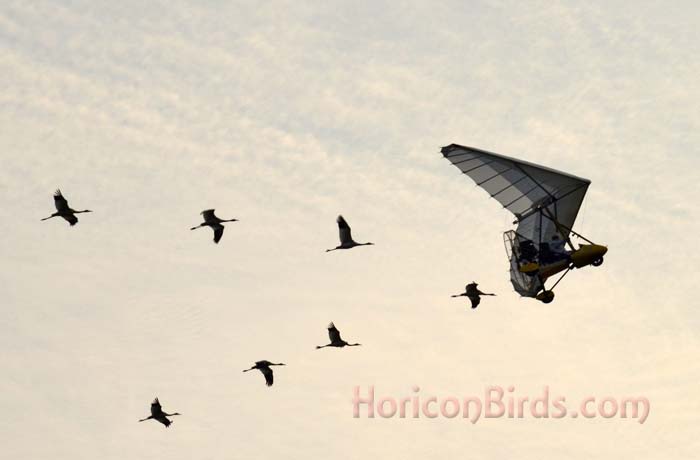|
Duff speaks in Princeton before Whooping Crane Festival
by Pam Rotella
13 September 2013
HoriconBirds.com
As this weekend's Whooping Crane Festival approaches, Joe Duff of Operation Migration described whooping cranes and his organization's crane migration training to neighboring residents of Princeton, Wisconsin, on Wednesday.

Operation Migration leads captive-bred whooping cranes through a "guided migration" program. In contrast to the Direct Autumn Release (DAR) whooping crane program at Horicon Marsh, where young whooping cranes must rely on older cranes in the area for guidance flying south, whooping cranes assigned to Operation Migration are taught to follow an ultra-light aircraft through their first migration from Wisconsin to Florida. The program, famous for its crane-costumed handlers and pilots, has successfully reestablished a whooping crane flyway that had previously disappeared from over-hunting.

The group's training site was moved from Necedah National Wildlife Refuge to White River Marsh Wildlife Area in 2011 due to black fly problems at Necedah, causing a high rate of nest abandonment. Duff described the problem to his group's new neighbors:
"We moved to White River Marsh because we originally did this study in Necedah National Wildlife Refuge, which is a lovely spot for bird walks and good habitat, lots of food, but unfortunately they have a large population of black flies. And, black flies -- you're probably familiar with them. They bite you behind the ears, and in the collar and stuff, unlike a mosquito who lands on your shirt, can't really bite you. But black flies burrow in.
"So, there's this bird who's nesting on the ground in the middle of a marsh. All of a sudden it turns 75 degrees, and the black flies come out en masse, burrow into their feathers, and just torment them until they abandon the nest.
"In fact, they were doing tests this year of black fly numbers at Necedah, and in one trap they had
85,000 black flies -- in one trap! One of the nests they discovered had been abandoned, and something had taken the eggs -- a crow or something -- and left just the shell, and there were 3,000 black flies in the shell.
"There are 128 species of black flies in North America. Three of them target birds, and all three are present at Necedah...
"...We're doing a lot of stuff to see if we can fix that situation with birds that are at Necedah... But in the meantime, we've moved to White River Marsh State Wildlife Area, and we're pleased to be here."
Whooping cranes remain among the most endangered species in North America, with about 600 alive today.
Operation Migration's Whooping Crane Festival is scheduled for this weekend at the Berlin Conservation Club in Berlin, Wisconsin.
All original content including photographs © 2013 by Pam Rotella.
|

